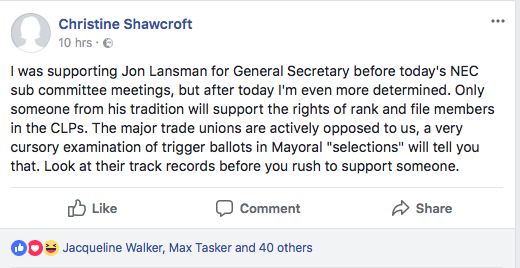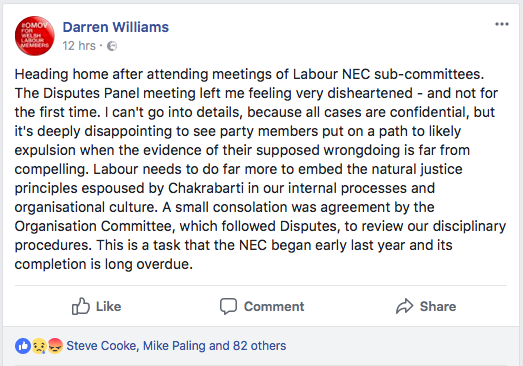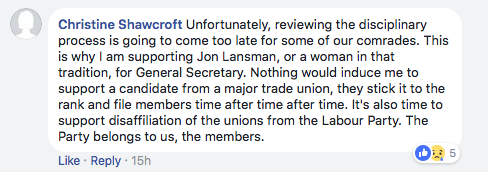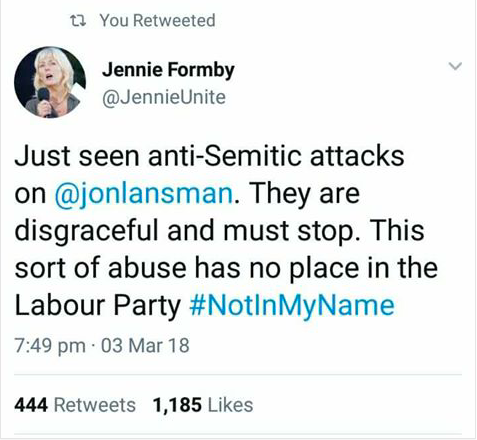Will Hodgson of gives an overview of the Liverpool conference
Without a doubt, this year was dominated by the struggle for greater party democracy – which is only to be welcomed. As a first-time conference-goer, this is a question that was raised time and time again both inside and outside the Arena and Convention Centre.
Obviously, the arrogant and self-entitled Parliamentary Labour Party needs to be brought under control as a matter of urgency. After all, the majority of Labour MPs have been plotting against Jeremy Corbyn since day one – if not before – attempting to sabotage him at every turn. Clearly, they are far to the right of the Labour membership and, once elected, usually enjoy a ‘job for life’. Indeed, some of them seem to think that they have a divine right to their elevated position. Should Corbyn become prime minister – which is far from certain, even if Labour wins the next general election – he would be held hostage by the PLP. In all likelihood the right would try one manoeuvre after another to get rid of him.
This struggle for democracy has crystallised around the fight for mandatory reselection (or open selection), a means by which the membership can exert some leverage over the careerists – Corbyn himself has stated on many occasions that he wants to empower the membership by giving it a real say in the decision-making process. Rule by the membership or rule by the PLP? Under the old trigger ballot system it was almost impossible to get rid of a sitting MP, as it gave disproportionate power to the labour bureaucracy.
Before conference, thousands of party members signed a petition from International Labour demanding the abolition of the undemocratic trigger ballot and the establishment of a truly democratic selection process before every election. The campaign appeared to receive a fillip when Unite’s general secretary, Len McCluskey, confirmed that he would fight to implement his union’s 2017 conference decision to support mandatory reselection. Then surprisingly even Momentum’s dictator Jon Lansman suddenly decided to go for mandatory reselection after having previously abandoned this old leftwing principle as soon as Jeremy Corbyn was elected.
Under pressure, Labour’s national executive committee felt it had to put somethingforward on the issue in order to contain the situation. Hence it proposed replacing the trigger ballot with two separate ones: the first for local affiliated bodies like unions; and the second for the local Labour Party branches. The threshold in both cases would be reduced from the current 50% to 33% and it would be enough for one of the two sections to vote ‘no’ to start a full selection process – ie, a contest between competing candidates. This represented a small step forward, but was still far from what is needed to hold our MPs properly to account.
Fudge
However, things were not what they seemed. The NEC’s inadequate proposals had been put into the rule changes coming from the Party Democracy Review (‘Corbyn Review’). As a result a vote in favour of the NEC package would mean that all other rule changeson any of the issues dealt with would automatically fall.
Responding to the ruse on the Sunday morning, delegates supportive of open selection tried to reject the report from the conference arrangements committee (CAC) – the only way you can change the proposed timetable. They demanded that rule changes should be discussed first, before the recommendations of the Corbyn Review. After a show of hands on the CAC report, the result was incredible, with around 95% of CLP delegates voting against the report. But, when the unions were asked to vote, the picture was the exact reverse: no more than half a dozen delegates put their hand up against the report (mainly delegates from the FBU), but about 50 voted in favour. But the whole union block counts for 50% of the total conference vote, so it was unclear which side had the majority and a card vote had to be called. The result was incredibly close: 53.63% voted for the report; 46.37% against. What was going on?
Well, it turned out, quite incredibly, that Unite had instructed its delegates to vote in favour of the CAC report despite its supposed commitment to open selection. McCluskey said afterwards that he did so “on the request of Jeremy Corbyn” – the Labour leader acting once again as the conciliator. Sounding hurt when pressed by angry delegates as to why the union had abandoned its position, McCluskey protested afterwards like Lady Macbeth that he had done nothing of the sort – oh no, perish the thought. Had the motion by International Labour reached conference floor, he claimed, Unite would have instructed its delegates to vote in favour– despite doing everything to prevent it.
Having lost the CAC battle in the morning, supporters of mandatory reselection tried to mobilise delegates to vote against section 8 in the NEC proposals, which dealt with parliamentary candidates, as well as section 6, which contained the NEC fudge on leadership elections. The latter had now been made worse. Just like before, any leadership candidate would still need the support of at least 10% of MPs/MEPs, but in addition would also require nominations from 5% of individual party members, or 5% of union and other affiliates.
Anyway, speaker after speaker got up to oppose section 8. But it was now Jon Lansman’s turn to have a sudden change of heart. Halfway through the debate, Lansman suddenly put out a message saying Momentum was now supporting section 8, because it “addresses one of the key flaws of the existing system by separating the party branches from affiliates” – which apparently “gives members the power to begin an open selection”. Yes, Lansman added ruefully, it “isn’t perfect”, but “it is a step forward and there is no guarantee any of the remaining rule changes on reselection will pass”. He implored Momentum-supporting delegates to back card vote 8, as “we may not get another chance to increase accountability of MPs”.
From then onwards, the speeches on conference floor shifted markedly, militancy beginning to dwindle. Most speakers were still supportive of open selection, of course, but more and more you heard comments like ‘A small step forward is better than the status quo’, and so on. How things could have been different. If conference had voted to reject section 8, despite McCluskey’s ‘tactic’ earlier in the day, then IL’s motion would have been tabled later – and, with Unite instructing its delegates to vote in favour of mandatory reselection, as McCluskey claimed it would, that motion almost certainly would have won. Alas, the climbdowns of both McCluskey and Lansman ensured that section 8 was carried with 65.94% support – and section 6 won with 63.94%. Thanks to the undemocratic three-year rule, this now means that both issues cannot be revisited until 2021.
These votes also emphasise the massive democratic deficit that exists within the party, especially when you take into account the sheer size of the trade union block vote (50% of the total). Given that the other six NEC rule changes coming out of the gutted Corbyn review were voted through with a majority of well over 90%, this can only mean that a vast majority of CLP delegates rejected the NEC’s proposals on these two issues.
Brexit
Another thing that has to be mentioned is the particularly egregious way that the compositing of motions has been used to exclude alternative and contending ideas – Brexit being a classic case. The Tories being in complete disarray on this vitally important matter, the Corbyn leadership and sections of the Labour right were able to find some common tactical ground – ie, that our priority must be to call for an immediate general election, so that a Labour government can negotiate a ‘sensible’ deal with the EU “in the interests of the country”.
However, the demand for a general election settles nothing, of course – which is why other sections of the right have opposed it as a fudge. Most notably they include the forces coalesced around the campaign for a People’s Vote, who naturally see it as yet another chance to initiate a slow coup against Corbyn’s leadership. Similar moves are underway in the unions, with leaders like Tim Roache of the GMB lining up to call for a second referendum. On the other hand, there is a minority who take a pro-Brexit view.
In other words, this is a very complex question, with many different positions adopted within the party. Thus over 150 contemporary motions were submitted on Brexit – the most ever received on a single issue at a Labour conference. This led to a marathon compositing meeting attended by around 250 delegates representing those who had put forward the various motions, which ended in the early hours of Monday morning. The upshot of all that was that Tuesday’s Brexit debate was on a composite motion that included both the leadership’s call to prioritise a general election and the possibility of a second referendum: “If we cannot get a general election, Labour must support all options remaining on the table, including campaigning for a public vote.”
Yet this is nothing new, obviously another fudge. The Labour leadership has been saying precisely this for a long time now, and the TUC two weeks ago basically voted for the Corbyn position as encapsulated in the above motion, stating only that another referendum should not be “ruled out”. The media got excited by the perceived spat between Sir Keir Starmer and John McDonnell – the latter echoing Len McCluskey, when he said that any new referendum should not include the ‘remain’ option and should focus solely on the terms of Brexit. Starmer, however, remarked that “nobody is ruling out ‘remain’ as an option”. Make of that what you will.
But oddly, whilst a large section of visitors to the conference gave huge rounds of applause to Starmer, as he spoke in support of the Brexit motion, the delegates largely sat on their hands – telling you something. In a strange twist of events, People’s Vote campaigners now seemed fairly happy with the motion (at least for the time being), even though it represented a fudge. Nothing has been resolved or properly debated – the compositing process serving to expose once again the democratic deficit within the party. In the end, conference passed the motion with around 99%support almost worthy of North Korea, despite the fact that there are obviously major differences of opinion on this question. For instance, the Tuesday edition of Red Pages– the daily commentary put out by Labour Party Marxists during the conference – seemed to go down well with many delegates, the headline demanding: ‘Brexit: reject the fudge composite motion’.
One more important thing that needs to be mentioned are those rule changes that sought to extend the use of ‘one member, one vote’ (Omov) – whether in the election of NEC members or even of the party’s general secretary. Similarly, the Party Democracy Review contained recommendations for “digital democracy” and “secure online voting systems”, with a new sub-clause passed, which promised: “the NEC shall invite CLPs to take part in pilots of staggered meetings; electronic attendance, online voting and other methods of maximising participation”.
However, for Marxists there are some serious problems with Omov. Just as we are opposed to the pseudo-democracy of national referendums – hence our opposition to a second Brexit referendum – as a general rule we are also against plebiscites in the party. There is a good reason why the move to Omov for the election of party leader began with the likes of Neil Kinnock and culminated in Ed Miliband’s Collins review – it was a rightwing ploy to dilute the working class nature of our party and atomise members by bringing the ‘common sense’ politics of the BBC or even The Sun into the Labour Party.
The same goes for so-called digital democracy, which too has the effect of atomising members – making it easier for them to be manipulated. Bear in mind the farce that was Jon Lansman’s Momentum coup – cynically presented as ‘democracy from below’. Omov, in Lansman’s hands, was a profoundly undemocratic move against the interests of the membership – one that stymied Momentum’s potential to be an effective, dynamic left trend in the party.
Online voting also marginalises the role of the unions. Yes, the representatives of rightwing unions have played an entirely negative role on the NEC. But in general the affiliation of unions is an enormous strength. While their bureaucratic leaders should not be allowed to prevent the democratic selection of parliamentary candidates, unions have clearly played an important role in preserving the character of the Labour Party as a workers’ party, even under Tony Blair.
But our main point remains this: one of our most powerful organising tools is representative democracy. We need to elect representatives who are accountable to and recallable by the party, and empower them to take informed decisions on our behalf.
Cordial
This being my first conference and, given the intensity of the campaign to cynically smear leftwing anti-Zionists as anti-Semitic – an example of the Big Lie in action – I was slightly apprehensive. Would Zionist supporters, Labour and non-Labour, try to provoke an unpleasant or even violent confrontation with comrades from LPM – on the basis that we are ‘Jew-haters’, and garbage like that. Last year in Brighton they gathered aggressively around our stall, snatching copies of Labour Party Marxists and generally tried to rile us.
In the end, I need not have worried. Curiously in some ways, the likes of the Jewish Labour Movement seemed almost entirely absent – no leaflets, papers, posters. No angry shouting. Maybe it was a deliberate decision to lie low. Indeed, the right in general was remarkably quiet. The most you got very occasionally was a delegate muttering ‘disgrace’, as they hurried past into the conference hall.
The vast majority of delegates, however, did not take seriously the accusation that anti-Zionism equals anti-Semitism, or that the radical left and Jeremy Corbyn posed an ‘existential threat’ to Jewish people in Britain. They know it is nonsense and were totally unfazed by the headline in the latest LPM, which read: ‘Why Israel is a racist state’ – with many expressing sympathy or agreement. The International Holocaust Remembrance Alliance’s so-called ‘definition’ of anti-Semitism has most definitely not captured hearts and minds.
In fact, the atmosphere was cordial and respectful – delegates and others were more than willing to engage with our arguments and share a joke. As alluded to earlier, it was easy to hand out Red Pages – which received a very warm reception.

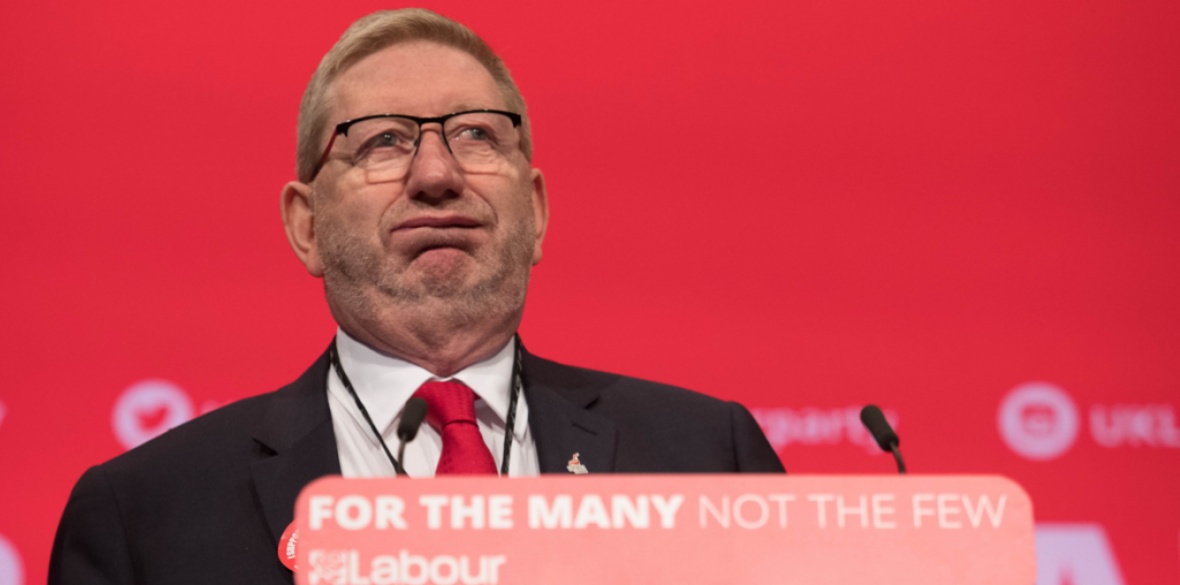
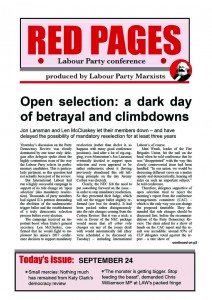
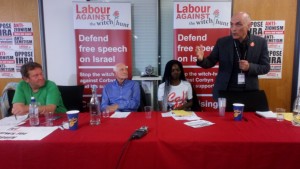
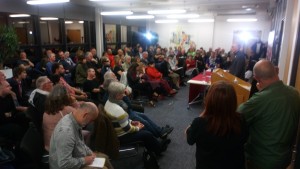
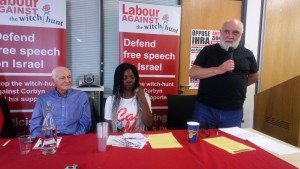
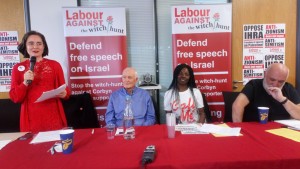
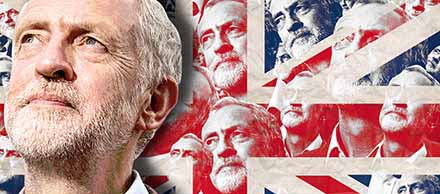
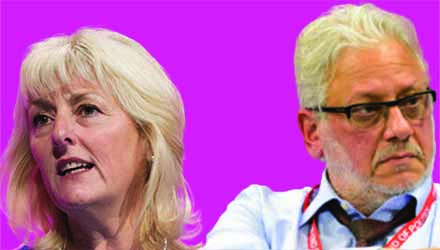
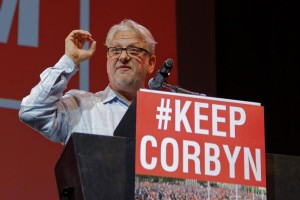 fter all, he is Mr Momentum, which has since its inception been portrayed as a dangerous hotbed for an assortment of hyperactive hippies and Trotskyist troublemakers. He has been on the ‘far left’ of the Labour Party for decades, we are told. However, over the last 14 months, Lansman certainly has been very busy moulding Momentum into a thoroughly respectable election machine.
fter all, he is Mr Momentum, which has since its inception been portrayed as a dangerous hotbed for an assortment of hyperactive hippies and Trotskyist troublemakers. He has been on the ‘far left’ of the Labour Party for decades, we are told. However, over the last 14 months, Lansman certainly has been very busy moulding Momentum into a thoroughly respectable election machine.